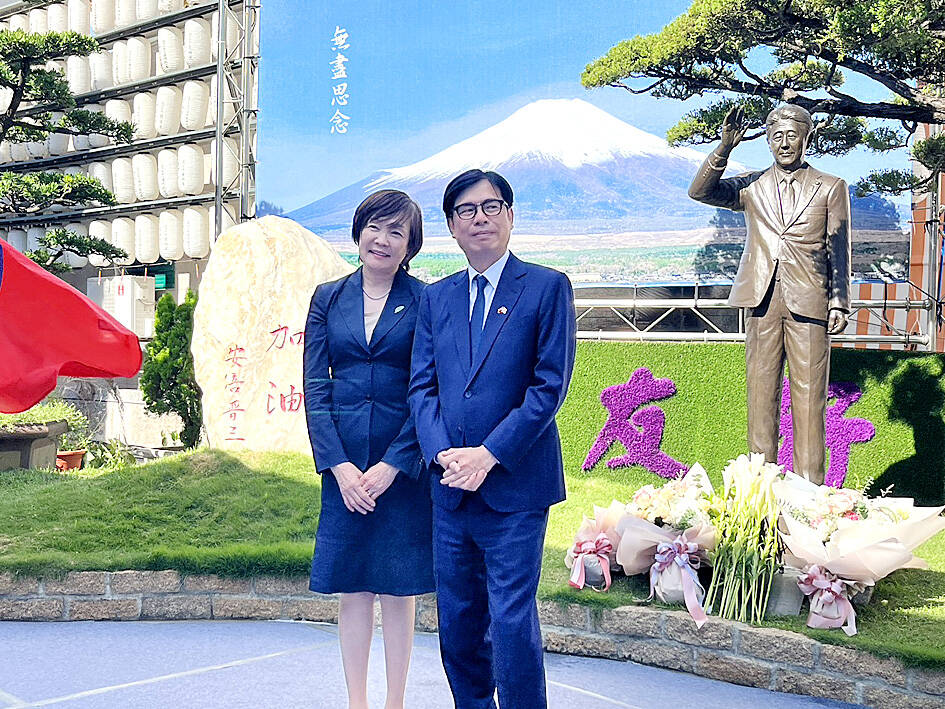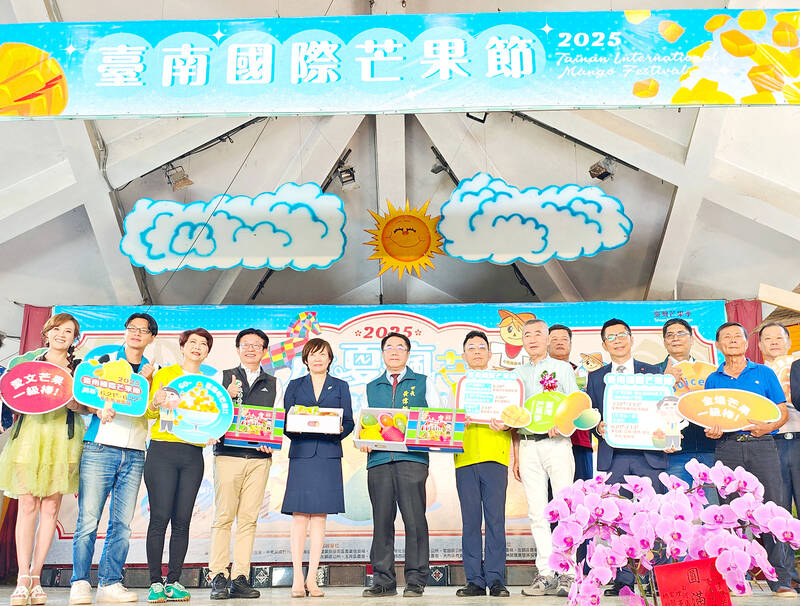Akie Abe, widow of the late former Japanese Prime Minister Shinzo Abe, yesterday expressed her gratitude to the people of Taiwan for keeping her husband’s memory alive.
“I’m very grateful to see so many people commemorating my husband,” she said during a visit to a temple in Kaohsiung dedicated to members of the Imperial Japanese Navy, where a bronze statue of Shinzo Abe was erected in 2020.
Akie Abe laid a wreath at the statue during her second visit to the site. She said she was moved by how many people continue to visit the statue.

Photo: CNA
“You are always so welcoming every time I come here, with such a grand ritual. I’m truly thankful for all of this,” she said.
She added it was unfortunate that her husband was unable to visit Taiwan while in office, but he had expressed his desire to do so after retirement.
Shinzo Abe, former president of the Liberal Democratic Party, was assassinated in July 2022. His two stints in office -- from 2006 to 2007 and from 2012 to 2020 -- make him Japan’s longest-serving prime minister to date.

Photo: Wu Chun-feng, Taipei Times
Due to the COVID-19 pandemic, he was unable to visit Taiwan after stepping down in 2020, Akie Abe said during her previous visit to the statue in July 2023.
“I’m sorry that he passed away before having the chance to come, but I believe his spirit remains with Taiwan, just as we do,” she said, adding that she would continue to promote the statue after returning to Japan.
Earlier yesterday, Akie Abe attended the opening of the Tainan International Mango Festival at the invitation of Tainan Mayor Huang Wei-che (黃偉哲).
According to a post by President William Lai (賴清德) on the social media platform X, the president hosted a dinner for Akie Abe in Tainan on Friday, during which Akie Abe presented Lai with a copy of her late husband’s memoir.

The inspection equipment and data transmission system for new robotic dogs that Taipei is planning to use for sidewalk patrols were developed by a Taiwanese company, the city’s New Construction Office said today, dismissing concerns that the China-made robots could pose a security risk. The city is bringing in smart robotic dogs to help with sidewalk inspections, Taipei Deputy Mayor Lee Ssu-chuan (李四川) said on Facebook. Equipped with a panoramic surveillance system, the robots would be able to automatically flag problems and easily navigate narrow sidewalks, making inspections faster and more accurate, Lee said. By collecting more accurate data, they would help Taipei

TAKING STOCK: The USMC is rebuilding a once-abandoned airfield in Palau to support large-scale ground operations as China’s missile range grows, Naval News reported The US Marine Corps (USMC) is considering new sites for stockpiling equipment in the West Pacific to harden military supply chains and enhance mobility across the Indo-Pacific region, US-based Naval News reported on Saturday. The proposed sites in Palau — one of Taiwan’s diplomatic allies — and Australia would enable a “rapid standup of stored equipment within a year” of the program’s approval, the report said, citing documents published by the USMC last month. In Palau, the service is rebuilding a formerly abandoned World War II-era airfield and establishing ancillary structures to support large-scale ground operations “as China’s missile range and magazine

A 72-year-old man in Kaohsiung was sentenced to 40 days in jail after he was found having sex with a 67-year-old woman under a slide in a public park on Sunday afternoon. At 3pm on Sunday, a mother surnamed Liang (梁) was with her child at a neighborhood park when they found the man, surnamed Tsai (蔡), and woman, surnamed Huang (黃), underneath the slide. Liang took her child away from the scene, took photographs of the two and called the police, who arrived and arrested the couple. During questioning, Tsai told police that he had met Huang that day and offered to

A British man was arrested for attempting to smuggle 14.37kg of marijuana into Taiwan through Taiwan Taoyuan International Airport, Taipei Customs said late yesterday. The man, who arrived from Bangkok at 9pm on Friday, was asked by customs officers to open his luggage during a random inspection, Taipei Customs said in a news release. The passenger, whose identity was not disclosed, refused to open his suitcase and tried to flee the restricted area. He was eventually subdued by three customs officials and an Aviation Police Bureau officer. A later search of his checked luggage uncovered 14.37kg of marijuana buds. The case was handed over